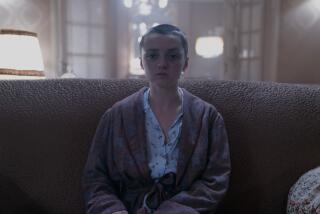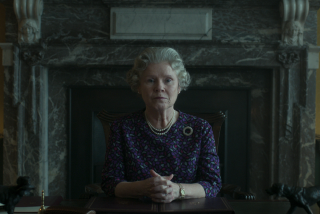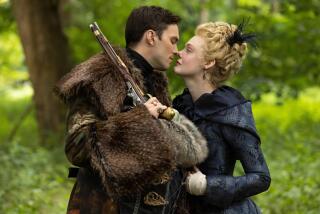Review: Helen Mirren rules in ‘Catherine the Great’
- Share via
“Don’t call me ma’am, I’m not the bloody queen,” Helen Mirren, as Detective Chief Inspector Jane Tennison, memorably said to a subordinate in “Prime Suspect.”
That might have been true of Tennison, but not of Mirren, who — her innate, earthy queenliness aside — has played many monarchs on screen and stage: Elizabeth I in the 2005 miniseries “Elizabeth I” and Elizabeth II the next year in Stephen Frears’ film “The Queen”; Queen Charlotte in the film of “The Madness of King George”; Titania, Queen of the Fairies in “A Midsummer Night’s Dream” for the BBC; the title character in the 1995 animated “The Snow Queen”; Lady Macbeth, who was queen of Scotland for a hot minute; and Milonia Caesonia, Malcolm McDowell’s missus in the bonkers smutfest “Caligula.”
Now, in “Catherine the Great,” HBO (in collaboration with Sky) has cast her as Russia’s most famous, unfairly infamous empress. I imagine she was on a short list of one. (All the more so, since the new series was written by Nigel Williams, who wrote “Elizabeth I.”)
The dramatic dynamic is this: Catherine, who became ruler of Russia by overthrowing her own husband, Peter II, in a coup d’état, is beset by various challenges to the throne. Pretenders keep popping up; the serfs regularly get restless. Meanwhile, Catherine keeps her simpering, sometimes scheming son Prince Paul (Joseph Quinn) on the sidelines. She wants a grandchild to leave the country to, not trusting her son. I cannot say whether we are meant to think of the British royal family, but I did.
Count Grigory Orlov (Richard Roxburgh), who helped put her on the throne and has been sharing her bed, is tired of waiting to be made an honest man — that is to say, of waiting to be king. (Catherine was not a power sharer.) His position is not improved by the arrival of Grigory Potemkin (Jason Clarke), a lieutenant with a crush on Catherine. Potemkin impresses her by knowing something about smallpox inoculation: Dr. Thomas Dimsdale has come to personally vaccinate Catherine, who hopes to provide an example to her people. “It’s a risk,” she says, “but then life’s a risk.”
Soon Catherine and Potemkin are are lovers, but the ways of palace life — the intrigue, the games — weigh on Potemkin.
“Love should be simple or it isn’t love,” he complains to Catherine’s kibbitzing confidante, Countess Bruce (Gina McKee), who asks him, “Why are you talking like a schoolgirl?” “Because that’s how she makes me feel,” Potemkin replies, “like a schoolgirl.”
As political history, “Catherine the Great” is sexed up — its subject did not suffer from erotic repression — but also, in a way, sexed down, because it means to redeem Catherine from centuries of calumny, innuendo, dirty jokes and scurrilous gossip we need not repeat here. Indeed, by HBO standards, it’s rather modest. There’s a brief sexual situation featuring female nudity about 16 minutes into the first hour, and after that, sauciness is put mostly aside to focus on the central romance: “I’m not interested in debauchery,” says Catherine. “I’m interested in love. That is all that interests me.”
It is true that she likes to have a body around (those Russian nights are cold, baby), and various expendable partners whose names you will not need to remember come and go between Potemkin’s heading off to pacify the Cossacks, conquer the Turks, build Sevastopol or create the Russian Navy. (I’m not sure it would have been possible to build an entire navy as a secret surprise for your sweetie, practically or politically, as Potemkin seems to do here, but I don’t know — it’s a long way from St. Petersburg to the Black Sea.)
As with most biopics, it is largely a matter of waiting around for history to happen, for the necessary points to be made. It is not a narrative powerhouse. Though some drama is hung on the question of freeing the serfs, which Catherine raises at the series’ beginning, the only questions that really matter are whether she’ll keep her crown, which you can just look up, and whether she’ll pull a little personal happiness out of the world, which you trust the drama to tell you.
It’s the right (and probably only) choice to make her relationship with Potemkin the heart of the story, especially since it also encompasses their mutual patriotism. Their courtship is laced with lines like, “My darling, our dreams for Russia are finally coming true” and exchanges like “I want the Ministry of War.” “You shall have it!” Sometimes Catherine is the uncannily canny, absolute boss of everything — there’s a reason she’s called Great — and sometimes she is just a girl standing in front of a boy asking him to love her. Sometimes she is both at once.
Mirren is the reason to watch, and reason enough. It’s no knock against the rest of the cast or the production designer or costumers or digital matte painters, who have all acquitted themselves bravely, even brilliantly, to say that there is no other particularly compelling reason to spend four hours in this slice of 18th century history. Obviously, Catherine is the nail that holds it all together; other characters — even Potemkin, called here “the great man of the age,” and whose name lives on via a battleship and the Sergei Eisenstein film about it — matter only in relation to her. But Mirren too rules this show. No one steals a scene from her, even when she isn’t in it.
With a career that’s ranged from the classics to the “Fast and Furious” franchise — yes, I know, that’s a classic too — she seems made to play Catherine in her many moods and modes. Actress and queen alike are spunky and sprightly, regal and vulgar; as did Catherine, reportedly, Mirren packs a lot of energy into a small package. She looks good in her big gowns and military finery, and she can rock a big fur hat like nobody’s business. (There is a drag ball, and she looks good in that too.) Shakespeare might have had Mirren in mind when he wrote, “Age cannot wither her, nor custom stale/Her infinite variety.” He was thinking of Cleopatra, another queen Mirren has played, across the decades, as if to prove a point.
‘Catherine the Great’
Where: HBO
When: 10:15 p.m. Monday
Rating: TV-MA (may be unsuitable for children under the age of 17)
More to Read
The complete guide to home viewing
Get Screen Gab for everything about the TV shows and streaming movies everyone’s talking about.
You may occasionally receive promotional content from the Los Angeles Times.







